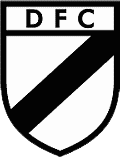Danubio F.C.
 | ||||
| Full name | Danubio Fútbol Club | |||
|---|---|---|---|---|
| Nickname(s) |
La Franja Los de la Curva La Universidad del Fútbol Uruguayo | |||
| Founded | 1 March 1932 | |||
| Ground |
Jardines del Hipódromo, Montevideo, Uruguay | |||
| Capacity | 18,000 | |||
| Chairman | Óscar Curuchet | |||
| Coach | Leonardo Ramos | |||
| League | Primera División Uruguaya | |||
| 2014–15 | 4th | |||
| Website | Club home page | |||
|
| ||||
Danubio Fútbol Club is a Uruguayan association football club based in Montevideo.
History
Danubio was founded by the Bulgarian-born brothers Miguel and Juan Lazaroff on 1 March 1932 together with other youths from the "Republica de Nicaragua" school in Montevideo. The club name is a reference to the Danube river, the major waterway in Europe.[1]
Famous players from the club include Álvaro Recoba, Ruben Sosa, Marcelo Zalayeta, Rubén Olivera,Rubén "Polillita" Da Silva, Javier Chevantón, Fabián Carini, Richard Núñez, Walter Gargano, Carlos Grossmuller, Ignacio María González, Edinson Cavani,Cristhian Stuani Jose Gimenez, and Camilo Mayada while Nery Castillo, and Diego Forlán played for the youth team, before continuing their careers abroad.
Danubio won their fourth Uruguayan league in 2013–14 champions of Uruguay after defeating Montevideo Wanderers on penalties after 120 minutes of football in the third final that finished 2-2 with a last minute bicycle kick equalizer from Camilo Mayada, previously they won their third league in 2006–07 champions of Uruguay after defeating Peñarol 4–1 in December 2006 to claim the Apertura with a very young Edinson Cavani scoring the last goal and then again defeating Peñarol on penalties to claim the 2007 Clausura. Danubio previously won the Uruguayan title in 2004 after defeating Nacional in the last kick of the game with a back hill goal scored by Diego Perrone and in 1988 with a fantastic young squad that included Ruben Polillita Da Silva who scored 30 goals on that season. [2]
Kit colours and design
The club decided in 1932 to take Montevideo Wanderers' kit and colours (black and white) as homage to them being the last amateur champion of Uruguay in 1931. Later when entering a zonal league they planned to alter the kit design as Universal Ramírez used the same pattern. The current design was inspired by the red sash over the white kit worn by River Plate, but with the sash in black. This design remains today. The accompanying shorts are typically black (although some seasons they have been white), whilst the accompanying socks are white. In the 2005–06 season, the club wore an unusual green shirt with a white sash as their third kit to play against teams similar in colours (such as Miramar Misiones and Wanderers). In 2007, green was reintroduced in a match against Saprissa of Costa Rica. As of late 2007,it was decided to discontinue use of the green shirt, due to the repetitive defeats against Wanderers and Miramar leading to it being considered a cursed shirt. Red is now used for the third kit.
|
1932
|
1940's–present
|
2005, 2007 third
|
2008 third
|
Honours
- 1943
Performance in CONMEBOL competitions
- Copa Libertadores: 7 appearances
- Copa Sudamericana: 6 appearances
- Copa CONMEBOL: 4 appearances
Current squad
As of 10 August 2015.
Note: Flags indicate national team as defined under FIFA eligibility rules. Players may hold more than one non-FIFA nationality.
|
|
Out on loan
Note: Flags indicate national team as defined under FIFA eligibility rules. Players may hold more than one non-FIFA nationality.
|
|
Coach Team 2012-13, 2013-14
After the departure of Daniel Sánchez from Danubio, Daniel Martínez coached the team for 2 games (2–2 against Liverpool & 2–4 against Wanderers). After that, Juan Ramón Carrasco assumed as the new lead coach, and Martínez was offered the management and coordination of all youth teams. As an assistant coach came with Carrasco, one of the most iconic coaches in the history of the club, that is Ildo Maneiro of course. He was the first coach to win an Uruguayan League for Danubio. Alejandro Martínez came as the physical trainer. Carrasco's son, Juan Carlos Carrasco assumed as coach of the Third Division. Leonardo Ramos ended winning Championship Play-offs, and Danubio becoming the 2013–14 Uruguayan Primera División Season Champions.
Records
Top 5 scorers of all time
-
 Diego Perrone (1996–03, 2004, 2009, 2010–12), 72 goals
Diego Perrone (1996–03, 2004, 2009, 2010–12), 72 goals -
 Rubén "Polillita" Da Silva (1986–89, 2001–04), 71 goals
Rubén "Polillita" Da Silva (1986–89, 2001–04), 71 goals -
 Ignacio Risso (1999–02, 2004–05), 69 goals
Ignacio Risso (1999–02, 2004–05), 69 goals -
 Javier Chevantón (1997–01), 53 goals
Javier Chevantón (1997–01), 53 goals -
 Ignacio "Nacho" González (2002–07), 51 goals
Ignacio "Nacho" González (2002–07), 51 goals
Most appearances of all time
-
 Carlos Romero (1947–62), 411 matches
Carlos Romero (1947–62), 411 matches
Notable coaches
|
|
References
- ↑ "Danubio's river of talent". FIFA. 23 July 2008. Retrieved 2009-01-13.
- ↑ Homewood, Brian (18 May 2007). "Soccer-Modest Danubio win Uruguayan championship". Reuters. Retrieved 2009-08-31.
External links
| Wikimedia Commons has media related to Danubio Fútbol Club. |
- (Spanish) Danubio's Official website